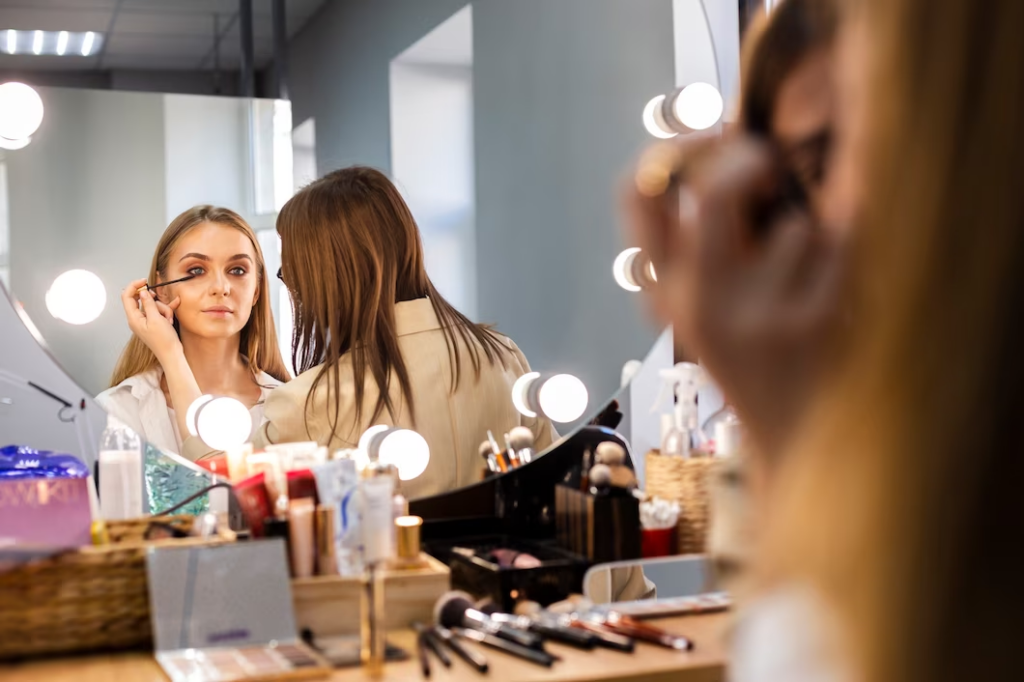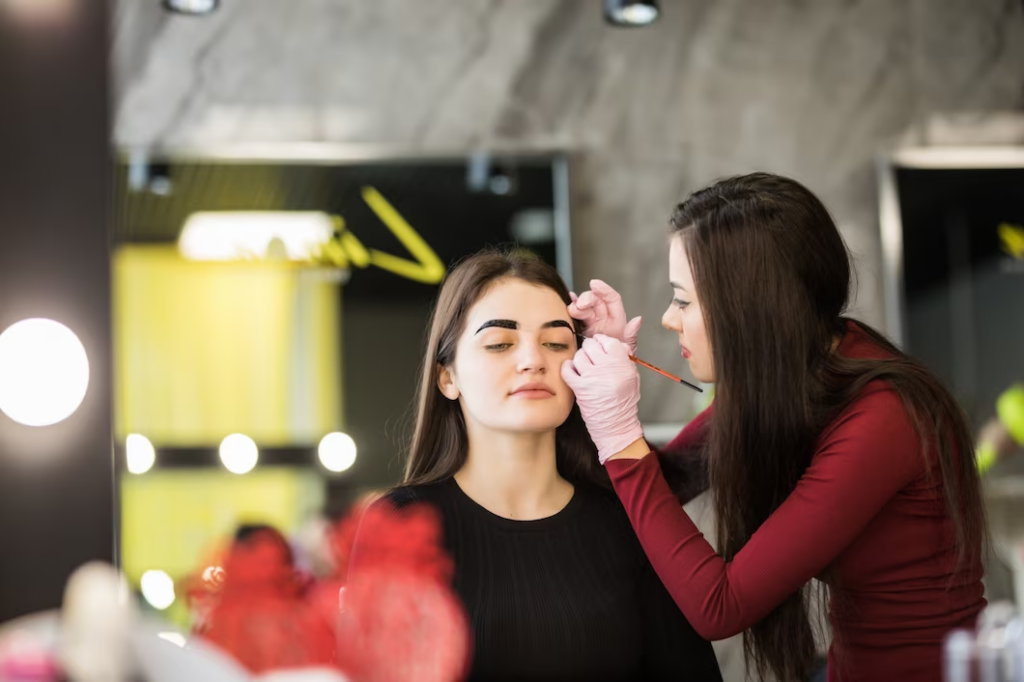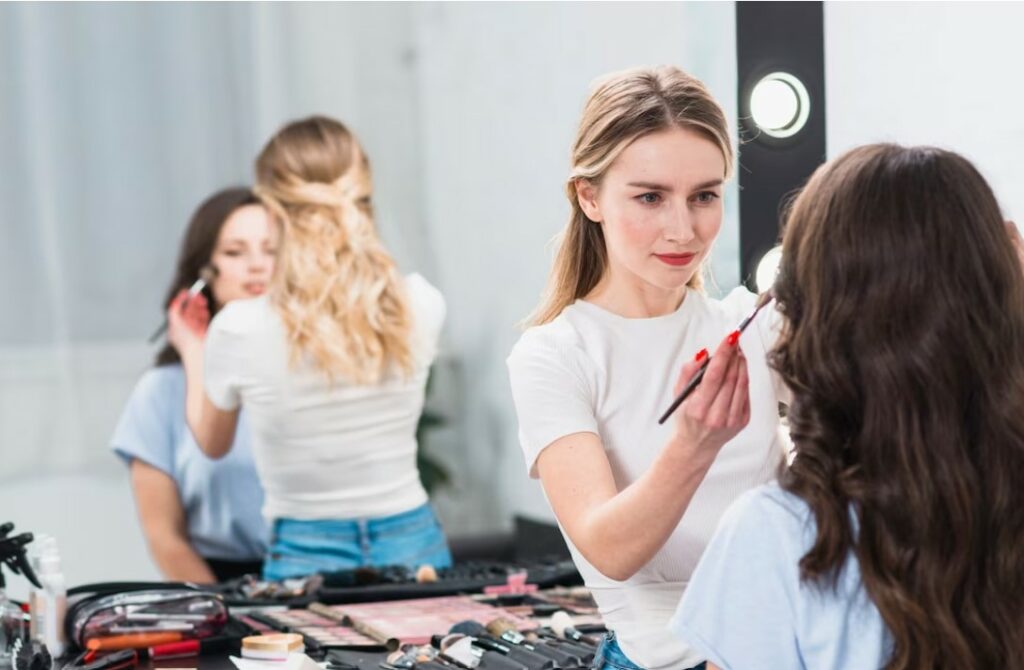One of the best and most lucrative industries in the world, makeup has quickly risen to prominence. In the past, people were not aware of how even a small amount of makeup could dramatically improve one’s appearance, boosting their self-confidence and personality. There is no chance that the phenomenal growth the beauty industry is experiencing will slow down any time soon. A person who works in the beauty and health sector is known as a makeup artist. To change or improve their clients’ appearance, they apply makeup and other cosmetics. You might enjoy the professional makeup artist course in Delhi, if you have an interest in cosmetics and are artistic or creative in some other way.
Do you enjoy applying blush and smoky eyeshadow? Are you interested in taking accredited makeup artist courses to advance your career? Continue reading to learn how to turn your creativity and passion into a fulfilling career. In this article, we go over the duties of a makeup artist and provide additional details about the field, such as the typical qualifications, working conditions, and compensation.
What is the job of a professional makeup artist?
A makeup artist can improve or change someone’s appearance using cosmetics and makeup application methods. Eyeshadow, eyeliner, concealer, foundation, lipstick, mascara, and application tools are a few of the makeup-related supplies that makeup artists work with. Additionally employed in the entertainment sector, makeup artists can help with the design and application of masks or other methods of altering a person’s appearance for a theatrical role.
Makeup, paint, wigs, and other accessories are used by makeup artists to visually alter people’s appearances. Makeup artists can choose the appropriate product and method based on the lighting, environment, and client’s physical features. They ensure that the client’s needs are met by applying both simple and complex makeup as requested by the client. Makeup artists can find employment in a range of sectors, such as entertainment, fashion, or cosmetics services. Additionally, they might function as a team member or freelancer.
Some basic tasks that a makeup artist performs are:
Communicate with customers to learn about their needs and preferences.
- Adhere to personal hygiene standards Stay current on the most recent best practises, tools, and technology in your field
- Identify the supplies and equipment that are required.
- help with putting on and taking off makeup and prosthetics
- Use professional makeup application technique.
- Recognise requirements from a technical and visual perspective.
- Make appropriate hairstyles to go with your makeup.
Makeup artist requirements
An individual can learn specific skills and gain product and method knowledge to work as a makeup artist. Although requirements may change depending on the employer, the following are some typical credentials for makeup artists:
Education
For the most part, postsecondary education is not necessary to become a makeup artist, and in many jobs, experience is valued more highly than education. For makeup artists to learn techniques and hone their application skills, some vocational schools and colleges offer cosmetic training programmes.
Typically, it takes one to three years to complete a programme at a vocational school or college. This kind of programme teaches students more about the various makeup products available, how to apply them, how to use the tools and equipment for applying makeup, and how to customise techniques and colour palettes for different clients based on their features and skin tones.
Training
Some makeup artists decide to receive training from licenced or seasoned professionals in order to gain experience. Others enter the field by working at cosmetic counters in drugstores and department stores where they can interact with customers seeking makeup advice while learning more about the products. Makeup artists must complete training programmes in some states in order to obtain the necessary experience hours.
Certifications
A makeup artist must comply with the state’s licencing requirements in order to practise in that state. In some states, makeup artists must complete a 1,500–2,000-hour training programme to become licenced cosmetologists. While makeup artistry is unregulated in some states, other states have makeup artist-specific licencing with training programmes lasting between 300 and 600 hours. Typically, colleges and vocational schools offer the state-mandated training programmes.
Skills
The following abilities are typically required of successful makers:
- knowledge of skincare, tools, and makeup
A makeup artist stays current in a field that is constantly changing and is knowledgeable about how to use all the tools and products that are available.
- The customer assistance
Makeup artists interact with clients directly, so it is critical that they always offer top-notch support and assistance.
- Communication
When applying makeup, makeup artists frequently walk their clients through the process, especially if the client wants to learn how to apply makeup themselves.
- Listening
Makeup artists pay attention to the needs and expectations of their customers and incorporate their suggestions.
- Time management
To avoid overbooking or keeping clients waiting, a makeup artist must show up for appointments on time and manage their time effectively.
- Organization
Being well-organized is necessary for managing a schedule. Additionally, makeup artists keep their supplies and equipment organized so they can quickly and effectively find what they need when applying makeup.
- Reliability
For significant occasions like weddings or prestigious award shows, people frequently hire makeup artists. Because of this, it is critical that makeup artists are dependable and punctual.
- Creativity
Creative abilities are required because makeup application is an artistic endeavor. When applying a variety of products, a makeup artist frequently views a client’s face as a blank canvas and considers how to best enhance the natural beauty.
- Teamwork
Although those working on film sets or in other environments with numerous clients may collaborate, makeup artists frequently work alone.
- Dexterity
To apply makeup correctly and avoid mistakes, you need to have good hand-eye coordination and dexterity.

How to get into the makeup industry
It helps to have a passion for cosmetics and the creative process of applying them if you want to become a makeup artist. Makeup artists must obtain licenses to perform this job in some states. Generally, to become a makeup artist, you can follow these steps:
1. Finish a training course
Although the length and complexity of professional makeup artist course vary, the majority call for students to log at least 300 hours working with an established makeup artist. Additionally, some makeup artists decide to enroll in programmes that teach makeup artistry. Your skill development and potential for employment may both benefit from completing a training programme.
2. Licensing for research
Obtain a license, if necessary. Make sure you understand the licensing requirements for this position in the state where you intend to work. In many states, it is illegal to practice as a professional makeup artist without a license. As you can compete with other candidates’ qualifications, obtaining a license may also increase your chances of landing a job.
3. Establish a portfolio
It is crucial for a makeup artist to document their clients and compile a portfolio as they gain more experience. Makeup artists can display their abilities and experience through portfolios. This can improve your resume and help you attract more clients. Most contemporary makeup artists rely on social media to share their online portfolios and attract more clients. For independent makeup artists, having a robust social media presence is especially crucial.
4. Maintain a resume
A current resume that emphasizes all pertinent work experience, skills, accomplishments, education, and training is equally as important as a portfolio. As you gain experience and expand your portfolio, think about occasionally updating your resume. You can list your certifications and a link to your portfolio on your resume.
Work Environment of Makeup Artist
Professionals in the beauty industry who work with using cosmetics to improve people’s appearance are known as makeup artists. They must satisfy the client’s needs. People who choose to work as makeup artists typically do so in a salon, spa, or makeup counter. He or she might offer runway models high fashion makeup services. People working in makeup artist jobs for new graduates offer services for actors in stage productions, brides getting ready for weddings, and models getting ready for fashion photographers.
A makeup artist uses tools for applying cosmetics, such as different kinds of brushes and sponges. Some makeup artists, such as those who work in photography studios and on movie sets, also use airbrushing tools or other cutting-edge materials to apply makeup.
Courses for Top Makeup Artists
More and more aspirants are turning to makeup-artist courses to learn all there is to know about the various facets of makeup and beauty as it develops into a fully-fledged career. The following courses are some of the best and most in-demand makeup artist courses available worldwide, helping students identify their true areas of interest. Let us look at what follows:
Body Art Bachelor of Arts
The human body is one such large canvas for fascinating body art that displays creativity. Students who earn a Bachelor of Arts in Body Arts will be well-versed in a variety of artistic disciplines, including tattooing and the anthropology of the human body. After completing these three-year Makeup Artist programmes, graduates can find employment in a variety of industries, including tattoo parlours, hair and beauty salons, film, television, and media companies, among others.
Makeup Artist Certification
These certificate programmes in makeup artistry last anywhere from six months to a year and give students a general background in the various beauty treatments. In-depth information on makeup artistry is covered in the course, including topics like character design, special effects, studio makeup, and others.
Beauty Therapy Diploma
A diploma in beauty therapy is one of the most well-liked and sought-after Makeup Artist courses because it prepares students to offer a wide range of beauty treatments, therapeutic services, and beauty advice to clients. The one-year programme gives students the knowledge they need to practise beauty therapy, including how to choose the best tools and methods for different parts of the body or face, how to apply makeup and apply nails, how to remove hair, how to treat lashes and brows, etc.
Check Also, Self Makeup Courses in Delhi
Basic Training in Makeup Artistry
The foundation programme in makeup artistry gives students all the skills they need to be skilled makeup artists, making it one of the most popular makeup artist courses among aspirants worldwide. Through this course, students will refine their practical skills and learn the intricate details of makeup application, hair styling, and other aesthetic medical procedures.
Career Prospects
Students can choose a career based on their interests after taking a professional makeup artist course. Leading beauty brands will collaborate with students. They are free to launch their own beauty brand if they so choose. Others might collaborate with companies that manage events or work as personal stylists or beauty advisers to celebrities. The pay is based on the services provided and the experience level. The range of salaries increases along with the number of years of experience.

Makeup Artist Types
Makeup artists come in a variety of forms, each with their own specialties and areas of expertise. Some of the most typical categories of makeup artists are listed below:
1. Bridal makeup artist
These makeup artists are experts at giving brides on their wedding day gorgeous, natural-looking makeup. They might also collaborate with other family members and members of the bridal party, such as bridesmaids and mothers of the bride and groom.
2. Fashion makeup artist
These make-up artists specialise in the fashion industry, creating daring and cutting-edge looks for editorial photo shoots, advertising campaigns, and runway shows.
3. Celebrity makeup artist
In order to create looks for red carpet occasions, film premieres, and other high-profile appearances, these makeup artists collaborate with celebrities.
4. Special effects makeup artist
These makeup artists are experts at transforming actors into various characters by applying prosthetics, scars, and other effects. They could be employed in theatre, television, or film.
5. Makeup artist for editorial use
These makeup artists produce makeup looks for fashion magazines, catalogues, and other publications. They work in the publishing sector.
6. cosmetics makeup artist
These makeup artists create makeup looks for customers while working for cosmetic companies like MAC, Sephora, and Estée Lauder to show how to use their products.
7. Theatrical makeup artist
These makeup artists specialize in creating dramatic stage makeup and character makeup for theatrical productions.
Conclusion
Although finding jobs as a makeup artist may initially seem difficult, keep in mind that as your network expands, it will become simpler.
You may also like
-
Best Times of Year for Rain Gutter Installation in Wisconsin: What Homeowners Should Know
-
How to Create One-of-a-Kind Engagement Invites That Tell Your Story
-
Unveiling the Top Picks: The Ultimate Guide to the Best Head Shavers in 2024
-
Choosing The Right Palette Insights into Professional Painting Contracts
-
Wear Your Imagination: Customized Text and Graphics T-shirt Printing in Sharjah

